
10/16/2019: Taiwan Spotlight: Sex Work, Media Networks, and Affective Labor in “The Fourth Portrait”

Sigur Center for Asian Studies
At the Elliott School of International Affairs
Select events will have audio recordings and transcript added to the archived page; the majority of events have audio available only by request to gsigur@gwu.edu.
Please find our 2009-2018 events archive here: https://www2.gwu.edu/~sigur/news/events-archive.htm




Thursday, September 26th, 2019
12:30 PM – 1:45 PM
Chung-wen Shih Conference. Room – Suite 503
Elliott School of International Affairs
1957 E Street, NW, Washington, DC 20052
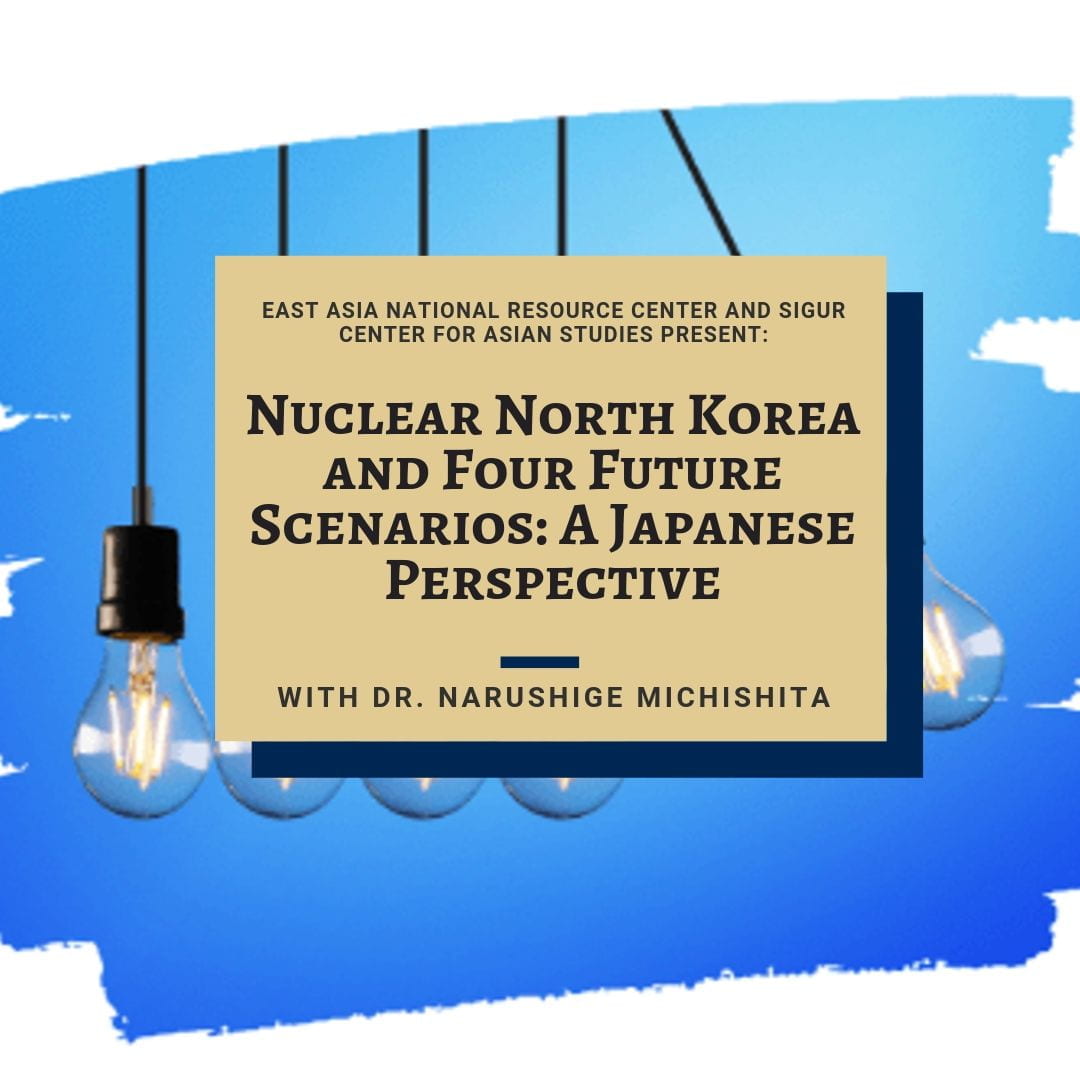
What should we expect for the future of the Korean peninsula? There are at least four possible scenarios: one good, two bad, and one tricky. Dr. Michishita will discuss what happens in each scenario, and how Japan might respond to it.
Narushige Michishita is vice president of the National Graduate Institute for Policy Studies (GRIPS) in Tokyo. He acquired his Ph.D. from the School of Advanced International Studies (SAIS), Johns Hopkins University. A specialist in Japanese security and foreign policy as well as security issues on the Korean Peninsula, he is the author of North Korea’s Military-Diplomatic Campaigns, 1966-2008 (Routledge, 2009) and Lessons of the Cold War in the Pacific: U.S. Maritime Strategy, Crisis Prevention, and Japan’s Role (Woodrow Wilson Center, 2016) (co-authored with Peter M. Swartz and David F. Winkler).


Tuesday, October 8th, 2019
12:30 PM-1:45 PM
Chung-wen Shih Conference. Room – Suite 503
Elliott School of International Affairs
1957 E Street, NW, Washington, DC 20052
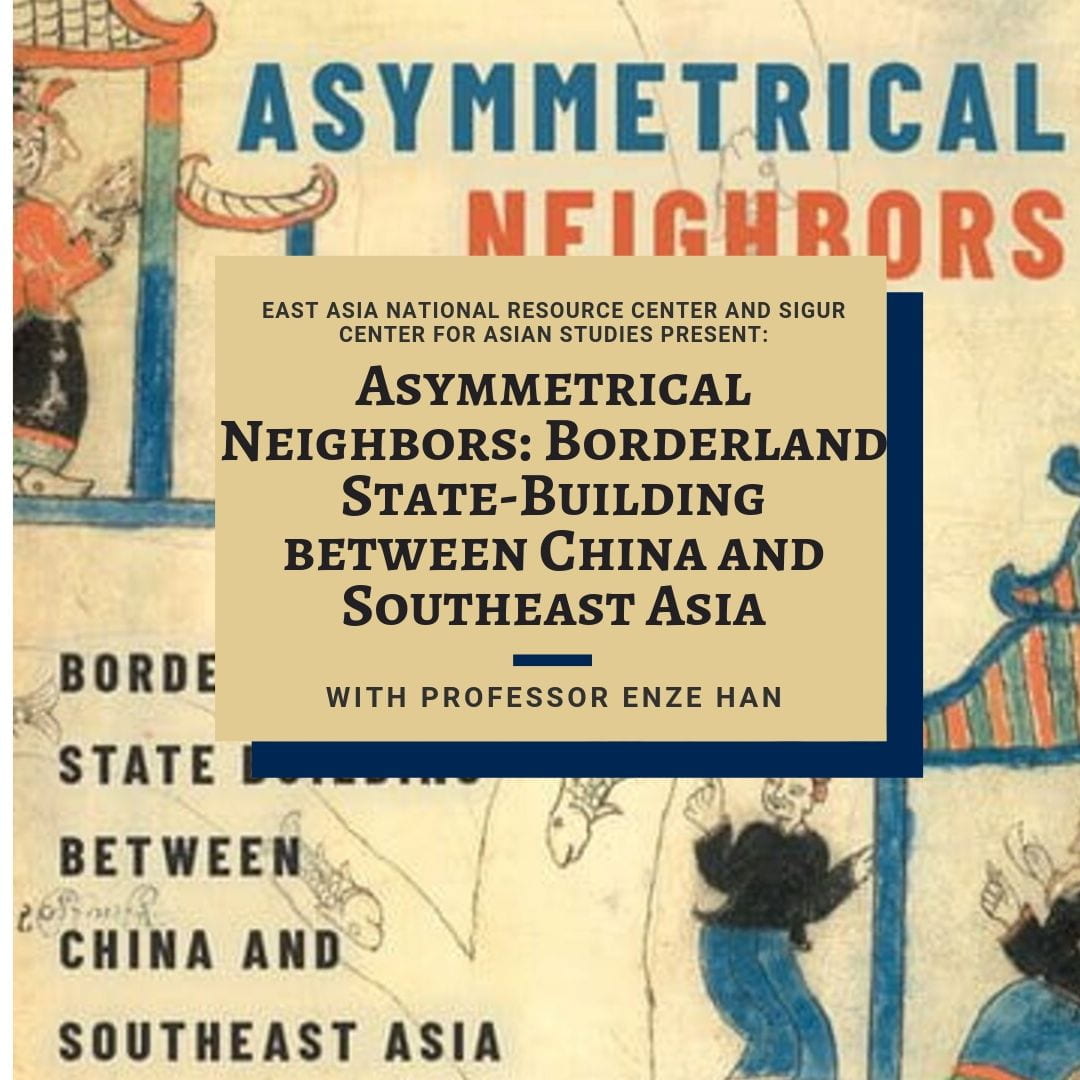
Event Description:
Is the process of state building a unilateral, national venture, or is it something more collaborative, taking place in the interstices between adjoining countries? To answer this question, this book takes a comparative look at the state building process along China, Myanmar, and Thailand’s common borderland area. It shows that the variations in state building among these neighboring countries are the result of an interactive process that occurs across national boundaries.
Departing from existing approaches that look at such processes from the angle of singular, bounded territorial states, the book argues that a more fruitful method is to examine how state and nation building in one country can influence, and be influenced by, the same processes across borders. It argues that the success or failure of one country’s state building is a process that extends beyond domestic factors such as war preparation, political institutions, and geographic and demographic variables. Rather, it shows that we should conceptualize state building as an interactive process heavily influenced by a “neighborhood effect.” Furthermore, the book moves beyond the academic boundaries that divide arbitrarily China studies and Southeast Asian studies by providing an analysis that ties the state and nation building processes in China with those of Southeast Asia.
About the Speaker:
Enze Han is an Associate Professor at the Department of Politics and Public Administration at the University of Hong Kong. His research interests include ethnic politics in China, China’s relations with Southeast Asia, and the politics of state formation in the borderland area between China, Myanmar and Thailand. Previously he was Senior Lecturer at the Department of Politics and International Studies at SOAS, University of London. His research has been supported by the Leverhulme Research Fellowship, and British Council/Newton Fund. During 2015-2016, he was a Friends Founders’ Circle Member of the School of Social Science at the Institute for Advanced Study in Princeton, USA. He is the author of Asymmetrical Neighbours: Borderland State Building between China and Southeast Asia (Oxford University Press, 2019), and Contestation and Adaptation: The Politics of National Identity in China (Oxford University Press, 2013).



Wednesday, October 2nd, 2019
12:30 PM – 1:45 PM
Room 505
Elliott School of International Affairs
1957 E Street, NW, Washington, DC 20052
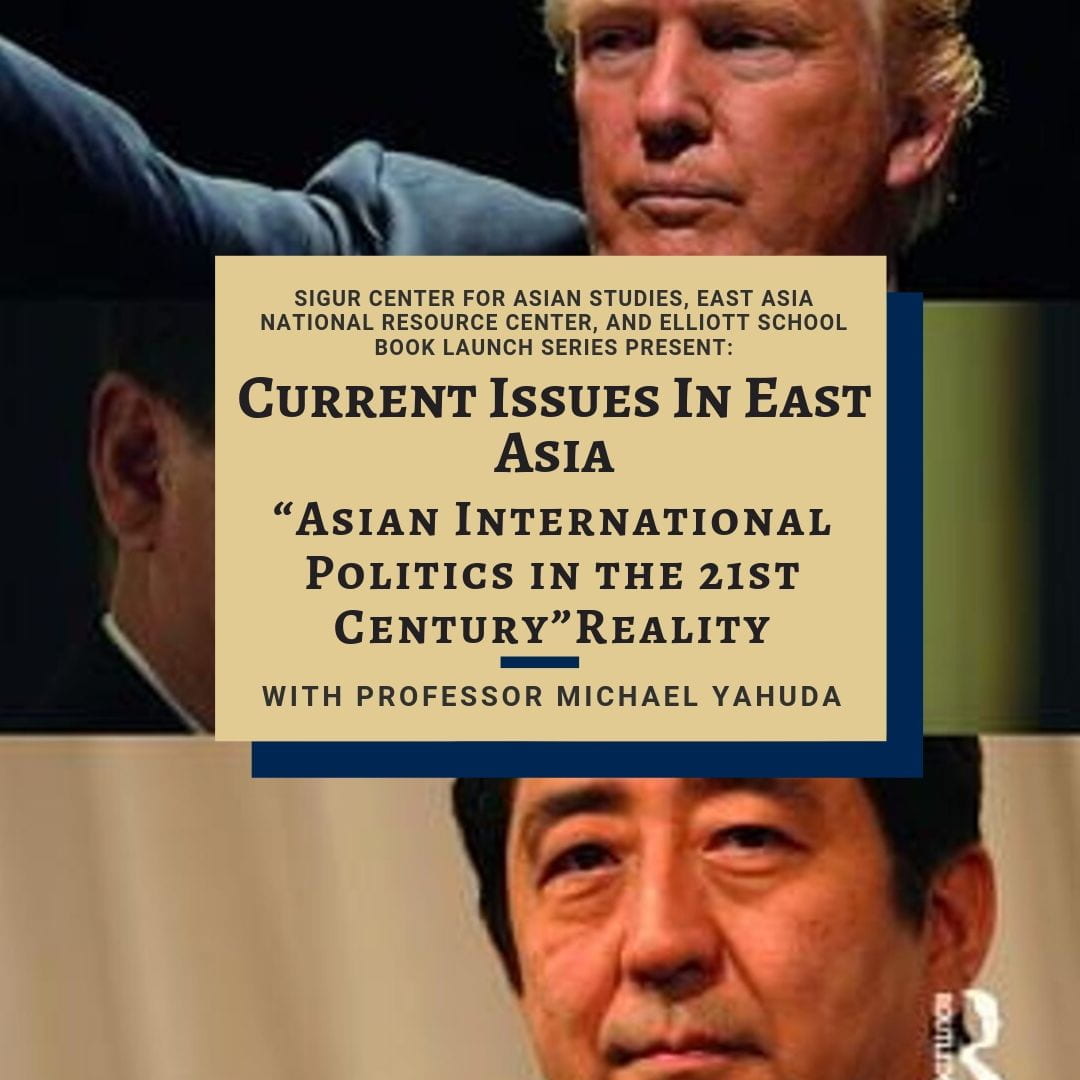
Following an evaluation of the legacy of the Cold War the author assesses the uncertainties of the post-Cold War era, the weakening of America by its prolonged warfare in the greater Middle East, by the enlarged war on terror and by the financial crisis of 2007-8. Amid the decline of the liberal world order and the rise of China, the author examines Chinese attempts to establish a new order. Analyzing politics in terms of the interplay between global, regional and local developments.
Michael Yahuda is a Professor Emeritus of International Relations at the London School of Economics and Political Science, University of London, where he served from 1973 to 2003. Since then he has been a visiting scholar at the Sigur Center for Asian Studies, the Elliott School, George Washington University, except for 2005-2006 when he was a Fellow at the Woodrow Wilson International Center for Scholars. He has been a Visiting Research Fellow at the Australian National University 1976 and a Visiting Professor at the University of Adelaide, (South Australia) 1981-83 and the University of Michigan, 1985-1986. He has also been a Guest Scholar, 1988 and Fellow at the Woodrow Wilson Center Washington, DC, 2011-2012 and the Fairbank Center for East Asian Studies, Harvard, 2005. He was a Visiting Senior Fellow at the Singaporean Institute for South East Asian Studies (2005) and at the Chinese Foreign Affairs University, Beijing (Autumn 2007). He has acted as an adviser to the British Foreign and Commonwealth Office and as a consultant to organizations in London and Singapore. His main fields of interest are China’s politics, foreign policy and the international relations of the Asia Pacific. He enjoys an international reputation as a specialist on the politics of East Asia. He has published ten books and more than 200 articles and chapters in books. His latest book is The International Politics of the Asia-Pacific (4th and completely revised edition, 2019).

Monday, September 30, 2019
11:45 AM – 1:00 PM
Lindner Commons, Room 602
Elliott School of International Affairs
1957 E Street NW, Washington, DC 20052
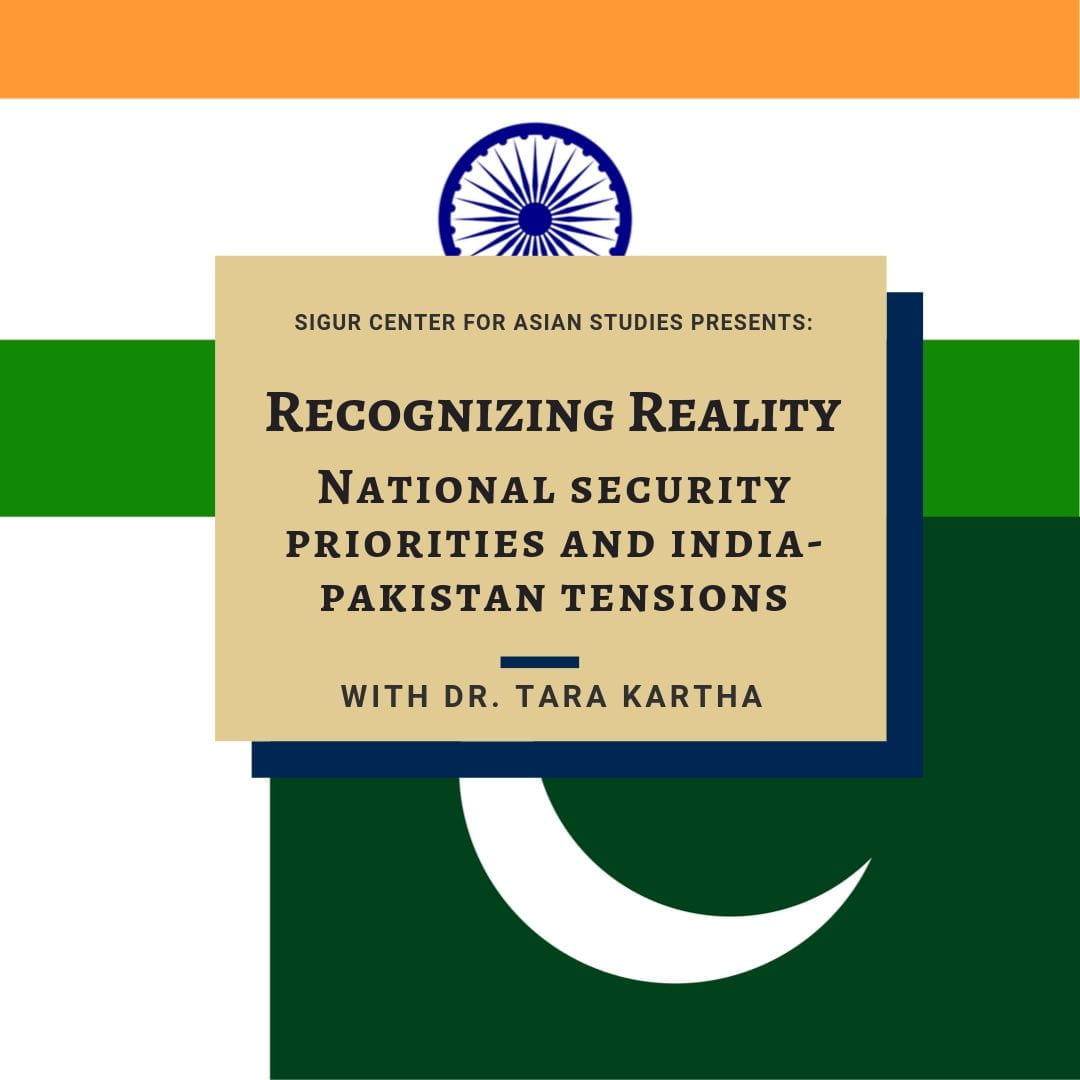
About the Speakers:
Dr. Tara Kartha has served in the National Security Council Secretariat (NSCS) for the Government of India during the tenure of 5 National Security Advisors. Her period of appointment at NSCS covered the Kargil War and the reform of the national security system that followed it. At NSCS she was also in charge of the National Security Advisory Board, which prepared the first Defense Review and the first National Security Review. Prior to this, she was nine years at the Institute of Defense Studies & Analyses (IDSA), New Delhi. She is now a Distinguished Fellow at the Institute of Peace and Conflict Studies (IPCS), New Delhi. At present, she is the Senior Jennings Randolph Fellow at the United States Institute of Peace, where she is co-authoring a monograph with Ambassador Jalil Jillani, former Foreign Secretary of Pakistan. She writes regularly for the Indian media, and tweets at @kartha_tara.
Dr. Deepa Ollapally (moderator) is directing a major research project on power and identity and the worldviews of rising and aspiring powers in Asia and Eurasia, the Rising Powers Initiative. Her research focuses on domestic foreign policy debates in India and its implications for regional security and global leadership of the U.S. Dr. Ollapally has received major grants from the Carnegie Corporation, MacArthur Foundation, Ford Foundation, the Rockefeller Foundation and the Asia Foundation for projects related to India and Asia. She is a frequent commentator in the media, including appearances on CNN, BBC, CBS, Reuters TV and the Diane Rehm Show.

Friday, September 27, 2019
3:00 PM – 5:00 PM
Chung-win Shih Conference Room, Suite 503
Elliott School of International Affairs
1957 E Street NW, Washington, DC 20052
The Sigur Center for Asian Studies welcome you to a discussion by our 6 Summer Language Fellows: Michael Kameras, Grayson Shor, Tracy Fu, Ander Tebbutt, Max Kaplan, and Josh Pope, covering Bahasa Indonesia and Mandarin Chinese in Indonesia and Taiwan. Our Fellows will share about their in-country learning experience and it will be followed by audience Q&A. Light refreshments will be served.
Interested in applying for grant money for next summer? Read more about our Research and Language Summer Grants at https://sigur.elliott.gwu.edu/sigur-center-grants-fellowships/

Wednesday, September 18, 2019
12:00 PM – 1:15 PM
Room 505
Elliott School of International Affairs
1957 E Street NW, Washington, DC 20052
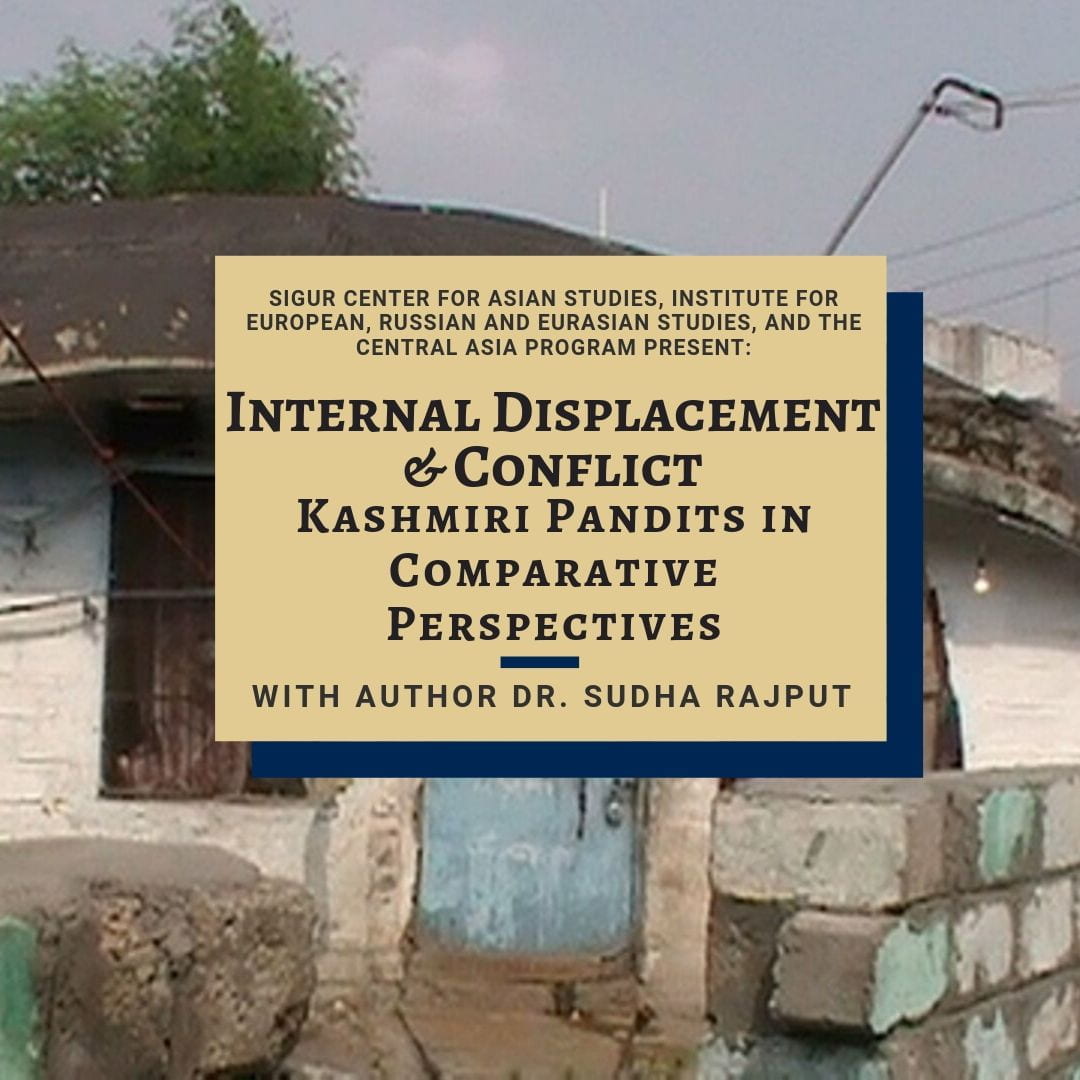
Grounded in multidisciplinary and multi-pronged research, Dr. Rajput presents the results of an important scholarly work that enhances an understanding of conflict-induced internal displacement in comparative, institutional, and human perspectives. The content ranges from high-level interviews, ethnographic participant-observation and oral histories to policy analysis, taking the audience to not only the geographically dispersed societies across the globe, but across societal levels: comparing national elite policy and institutional actors with the lived experience of families within compartmentalized ‘migrant townships’.
Focused primarily on the forcibly displaced Kashmiri Pandits, forced out from Kashmir Valley in 1989, the analysis also includes case studies of similarly displaced communities of Azerbaijan, Georgia, Serbia, and Sudan (Darfur).
The book helps answer two of the most perplexing questions surrounding conflict-induced protracted displacement, namely: how do positions embraced by key actors inform IDP policies, and why despite the official return policies, families remain reluctant to return and equally reluctant to embrace host communities?
About the Speaker:
Dr. Sudha G. Rajput is the author of Internal Displacement and Conflict: The Kashmiri Pandits in Comparative Perspective (Routledge). Her 31-year career at the World Bank touched on multiple aspects of international development, working on thirteen countries of the former Soviet Union. Her co-authored book chapters appear in Scientific Explorations of Cause and Consequence across Social Contexts (Praeger) and in State, Society, and Minorities in Southeast Asia (Lexington Books). She writes for the Forced Migration Review. Her doctoral research has investigated issues of conflict-induced displacement in Kashmir, with a focus on societal and policy reform, leading her efforts to the development of a graduate course, Refugees and IDP Issues, drawing students from fields of conflict resolution, international development, humanitarian assistance and peace-building.
She is a Senior Researcher at the Refugee Law Initiative, a U.K. based think-tank. She is a Consultant/Trainer for USAID, designing and conducting capacity building workshops in Khartoum, Sudan, promoting cross-border co-existence. As a Professional Lecturer, at George Washington University, she teaches at the
Elliott School of International Affairs, where she brings multi-disciplinary approaches to her course on Refugee and Migrant Crisis. She is a trainer for the Forage Center for Peacebuilding Education, where during a 4-day humanitarian assistance simulation, she coaches students on systematic understanding of protracted displacements. She teaches at the University of Maryland Global Campus, delivering the MBA program for the military students. Her interests on post-conflict issues include her past travels to: Bosnia, Bulgaria, Croatia, Georgia, Kazakhstan, Kosovo, Macedonia, Montenegro, Serbia, Sudan, and Ukraine.

Tuesday, September 10, 2019
2:15 PM – 3:45 PM
Chung-win Shih Conference Room, Suite 503,
Elliott School of International Affairs
1957 E Street NW, Washington, DC 20052
The Sigur Center for Asian Studies welcome you to a discussion by our 3 Summer Research Fellows, Abhilasha Sahay, Erica Sedlander, and Paromita De. Our Fellows will share about their in-country research experience and findings, followed by audience Q&A.